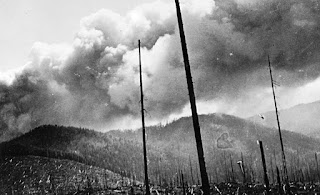The annual affliction
By BILL MILLER
For the Mail Tribune
“Heavy fires in the mountains have
filled the air with smoke, making it altogether unlovely and uncomfortable.”
If you thought that was a recent
letter to the editor from a beleaguered reader who likes to breathe, you’d be
wrong. In fact, it’s an editorial comment from an 1872 Jacksonville newspaper.
Last year brought out considerable
complaints about fires and the oppressive smoke that filled our valley. For
some reason, everyone seemed so surprised—but why? As one of our 19th
century
reporters said, “It would be a too fortunate occurrence if we should
escape such an annual affliction.”
One wonders if anyone even
remembers our summer of smoke way back in 2002. That summer was so bad that
after four months of cabin fever, my wife and I gave up and headed north to
Washington for a tour of Mt. St. Helens and a clean-air visit to old friends.
It was about that time that our
decade-old home insurance company raised our rates and defended themselves by
saying something like, “we have determined that you live within an extreme
forestry fire zone.” Well, yeah. This is Oregon and the Upper Rogue. What took
ya so long?
Fire and smoke are nothing new around
these parts. There are dozens of years over the past century and a half to
choose from—where newspaper reporters put their complaints in print.
The summer and fall of 1869 comes
to mind. The inferno began in early July and residents of the valley were not
happy.
“The atmosphere has been perfectly
saturated with smoke for the last week, so much so that it has been difficult
to see more than a half mile in any direction.”
After days of desperation, waiting
for relief, our reporter was losing hope.
“A large fire is now raging in the
mountains and forests. If we do not have rain very soon, much damage will be
done.”
Then, the inevitable blame game began.
“Of late years, smoky weather has
become a nuisance. We cannot have even a few days fair without the valley being
filled with this unwholesome element. It is supposed to originate from fires in
the mountains, started by reckless rovers and hunters who are certainly devoid
of good judgment, to say the least.”
Our editor concluded that anyone
who started a fire should spend time in the Salem penitentiary.
By late August, it was worse.
“Smoke still continues in this valley and seems to be more intense than ever.”
At the same time, James Sutton was
leading an excursion to Crater Lake and noted in his
report that the smoke had
become part of his journey.
“At 10 o’clock at night, dense
clouds of smoke mantled the surrounding hills. … During the day, the air was
loaded with smoke, yet we were enabled to enjoy many grand views along the big
banks of Anna’s Creek.”
As with most forest fires, completely
snuffing out this blaze, as well as the 1872 fire we began with, is usually
left to Mother Nature.
“The equinoctial storm has
effectually extinguished the fires in the mountains. The dense pall, which has
enveloped the valley for so long, is rapidly clearing. The sky and sun are once
more visible—weather cool and pleasant.”
Nobody likes the smoke, but
everyone loves Mother Nature. Especially when the rains come pouring down at
just the right time.
Writer
Bill Miller is the author of “History Snoopin’,”a collection of his previous
history columns and stories. Reach him at newsmiller@live.com or
WilliamMMiller.com.





